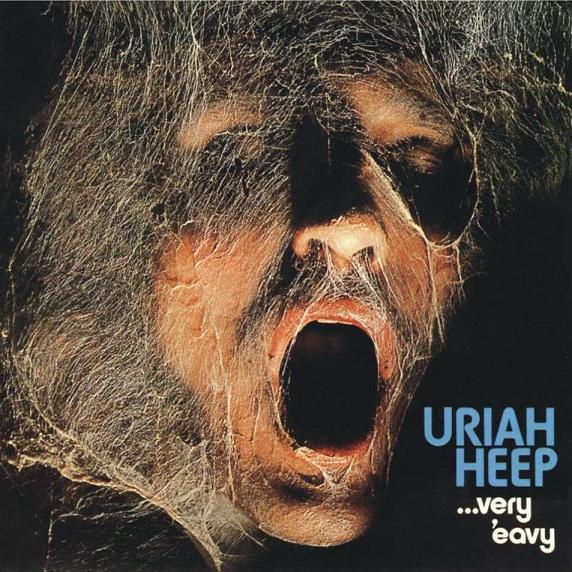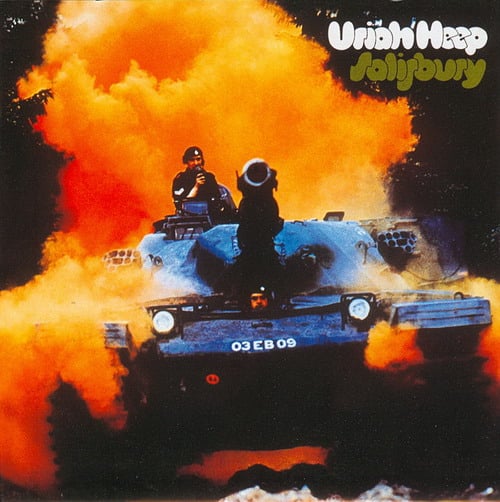 Stranger than the sunrise, darker than the night
Stranger than the sunrise, darker than the night
Very 'eavy and not at all 'umble, Uriah Heep were the fourth of the 'big three' in the first generation of heavy metal (and if you don't know which three, go straight to prison, don't collect $50!). They are by no means my favourite band, not even in the hard rock genre, but there once was a period of time during which they were. And in retrospect it's not that hard to see why. See, they were there from the very beginning, 1969 and onward, so obviously they must be the real deal, right? And they rocked just as hard as any metal act of the era with their uncompromising thumping anthems which vouched for some serious headbanging, right? And they did this in total harmony with bombastic melodies and artsy arrangements, sometimes bordering on symphonic prog which surely satisfied even the slightly more intelligent listener, right?
Well, not quite. See, Uriah Heep are essentially a
dumb band, something which I definitely would not acknowledge way back when I propagated to my friends the awesomeness of "Demons & wizards". That's not to say they were that dumb themselves, but there are three main issues about them that prevent me from taking them very seriously these days. First, they were very limited in songwriting, often laid in the lap of keyboardist Ken Hensley, both from the perspective of a riff-based metal band as well as a melody-based art band. When I think about it, there are very few classic riffs to be found in their catalogue, and none of them are particularily profound unless you count their patented primitive powerchord sequences, established from the very beginning in "Gypsy". And the melodies, albeit slightly better, tend to be equally primitive and repetitive even on the numbers that aim for a higher goal, like "July morning" although this was the schtick they eventually would expand on the most until they degenerated into a bland soft-rock act in the late 70's.
Second, they were inadequate; All of them were decent instrumentalists, but none of them were really able to match some of the ambitions they set up for themselves on the more bombastic numbers (warning example: "The magician's birthday"). Instead they often ended up proving themselves unable to rise above the caveman approach in their lack of chops. And all those tales of wizards and demons and mystery tales and spider women and pilgrims were never backed up by any true substance. You're welcome to prove me wrong, but in the process of showing off their highly superficial literacy they more or less single-handedly invented the whole D&D imagery that to this day has infested heavy metal in general, all through the warriors of power metal, the satanic priests of black metal and the flesh-eating bacteria of death metal. So I gotta give them that; Thanks alot guys, for making generations of kids taking metal too seriously! Really thoughtful of you! In their defence though, Hensley openly admitted that "Demons & wizards" were just "a collection of songs which they had a really good time recording".
Third, they were - and this is the main factor which both of these abovementioned factors are derived from - dumb. This is probably something they were quite aware of themselves, which is why they from time to time allowed themselves a primitive but playful barroom rocker to which you could chug your beer. I admit that this is their most adequate approach and some of the tracks that falls into this category work just fine ("Love machine", "Easy livin'", "Spider woman" etc.) but however adequate in its own field, I still loath this whole approach. See, as differed from the mysticism, it boosted the c o c k-rock part of the metal community and this is maybe even worse. Anyone participating in clearing the ground for Aerosmith and Kiss, not to mention the hair metal of the 80's, has to be scorned for that. And this third factor is
the main foundation of their fanbase, swallowing the bait of artsiness in order to persuade itself of being slightly more intelligent than yer average headbanger, something that the Heepsters have in common with Queen by the way.
But as I said, I used to like them a lot and I still somewhat do, because if I didn't, I wouldn't take all this time to theorize about them. True to what I said above, I reckon them as somewhat groundbreaking in their approach and however bad they were as influences, they still were good in their own right (good bands are often bad influences). Even if they surely rocked hard, I still think their main attraction during the classic years is the often successful simplistic bombast, at least when it's backing up a profound melody, and their harmonies simply cannot be beat. They are sometimes deemed as a 'poor man's Deep Purple", although I feel that is an unfair comparisation. Apart from the organ, which besides always were more prominent in Heep, they had little in common with Purple, much less Sabbath although some of Heep's more laid-back numbers bore some resemblance of Zeppelin in folksy mode. But all in all, Heep sure had an original sound which, as I hinted above, sort of pinoeered the use of opera-tinged bombast which Queen would expand on later on. And they have their fair share of good, and even awesome, songs as well. Just remember to never
ever take their lyrics into account.
So, with the beneficial stand of a deeply rooted acquintance combined with a notably more critical view induced by time, consider these reviews as me washing my hands of both the undeserved scorn and the uncalled for praise for the arguably fourth best metal band of all time.









 Linear Mode
Linear Mode
